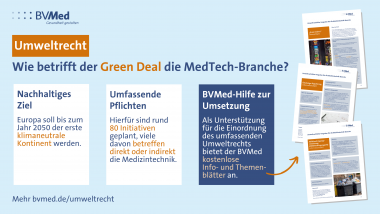BVMed-Infoblätter zum Umweltrecht
Der Bundesverband Medizintechnologie (BVMed) gibt Medizinprodukte-Unternehmen mit einer Reihe von Infoblättern eine Übersicht zu den immer komplexer werdenden umweltrechtlichen Vorgaben. Der kostenfreie BVMed-Service unter www.bvmed.de/umweltrecht vermittelt einen Überblick zu den Anwendungsbereichen und entstehenden Pflichten aus der Umweltgesetzgebung.
Mit der aktuellen Umsetzung des „Green Deal“ der Europäischen Union soll Europa der erste klimaneutrale Kontinent werden. „Hierfür sind rund 80 Initiativen geplant, viele davon betreffen direkt oder indirekt die Medizintechnik-Branche“, so die BVMed-Nachhaltigkeitsexpertinnen Dr. Christina Ziegenberg und Clara Allonge. Themen wie Klimaneutralität und ressourcenschonende Produktionsprozesse werden immer stärker in den Fokus rücken und die Verbandsarbeit neu ausrichten. Als Unterstützung für die Einordnung des umfassenden Umweltrechts bietet der BVMed in Zusammenarbeit mit der Produktkanzlei eine Übersicht zu den umweltrechtlichen Vorgaben an.
Die ersten sechs Infoblätter geben eine Übersicht zu folgenden Gesetzen und Themen:
- Abfallverbringungsverordnung: Aktuell liegt ein Vorschlag für eine komplette Neufassung der AbfallverbringungsVO vor.
- CLP-Verordnung über die Einstufung, Kennzeichnung und Verpackung von Stoffen und Gemischen: Aktuell wird auf EU-Ebene die Revision der CLP-VO vorangetrieben.
- „Green Claims“: Enthält relevante rechtliche Themen im Bereich der Werbung mit Aussagen aus dem Bereich ESG („environmental, social, governance“).
- Kreislaufwirtschaftsgesetz: Vor dem Hintergrund des „Green Deal“ und des darunter verabschiedeten „Circular Economy Action Plan“ der EU sind gegenwärtig alle abfallrechtlichen Regelungsbereiche Gegenstand von Evaluierungs- und Überarbeitungsprozessen.
- Ökodesign-Regulierung: In Deutschland setzen das Energieverbrauchsrelevante-Produkte-Gesetz (EVPG) und die EVPG-Verordnung (EVPGV) die Ökodesign-Richtlinie in nationales Recht um.
- Verpackungsgesetz: Gegenwärtig läuft auf EU-Ebene eine Initiative zur Überarbeitung der Richtlinie. Am 30. November 2022 wurde der Vorschlag für eine Verordnung über Verpackungen und Verpackungsabfälle von der EU-Kommission veröffentlicht.
Die Info-/Themenblätter decken folgende Inhalte ab:
- Name und Verkündungsstand des Rechtsaktes
- Hintergrundinformationen (beispielsweise die Umsetzung des europäischen Rechts durch nationale Rechtsakte)
- Beschreibung von Anwendungsbereich und Ausnahmen
- Beschreibung von Betroffenheit/Rollen
- Stichpunkte zu den Pflichten
- aktuelle Entwicklungen (beispielsweise laufende Gesetzgebungsverfahren oder Ankündigungen in Arbeitsprogrammen)
In Zusammenarbeit mit der Produktkanzlei wird der BVMed in den nächsten Monaten weitere Infoblätter erarbeiten.
BVMed









